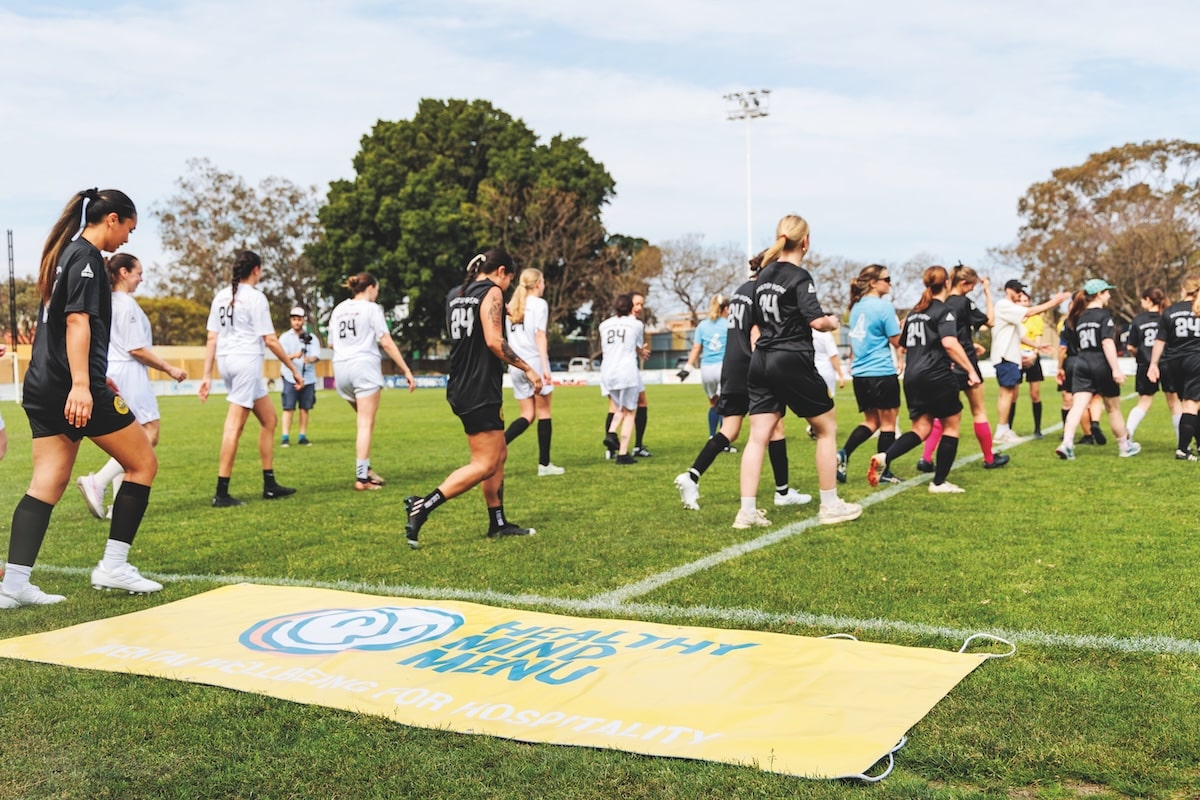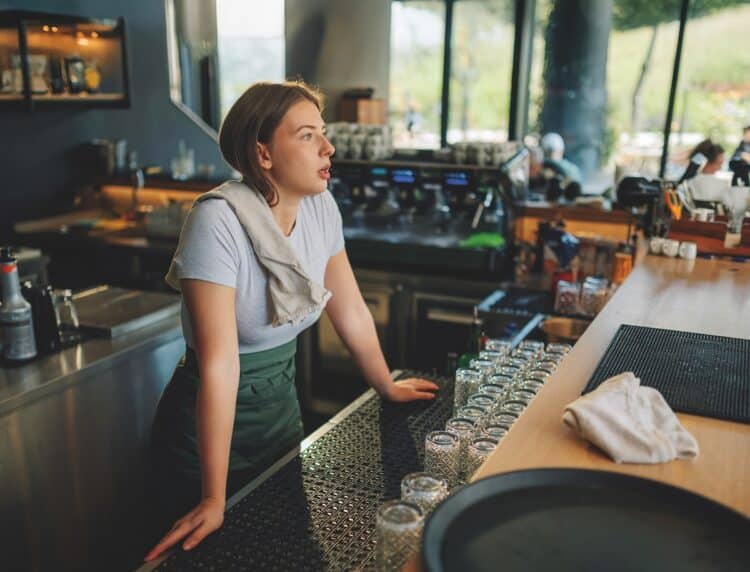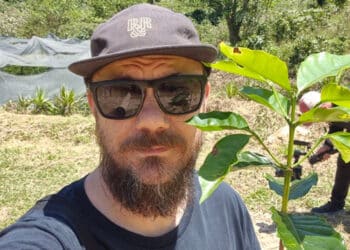Hospitality is full of fast-paced and taxing roles, with workers often bearing the brunt of disgruntled customers. Is enough being done to support people working in the coffee industry?
In 2019, non-profit organisation R U OK? undertook a survey about mental health in hospitality. The responses from participants indicated the industry needed to change.
Eighty per cent of those surveyed believed mental health issues such as depression and anxiety were a challenge, while 50 per cent reported wishing someone at work had checked in on them.
The world has moved forward in the mental health and wellbeing space in the six years since that survey was conducted, but there are still significant issues facing the sector according to Healthy Mind Menu’s Paisley Fogarty.
Healthy Mind Menu is a Perth-based charity founded in 2018 following a tragic number of chef suicides in the local industry. Now, it offers resources to venues across Australia looking to improve mental health outcomes in their workplaces.
In 2023, there was little data on the specific issues facing hospitality workers, so the charity undertook its own study in collaboration with Edith Cowan University.
It found, even four years after the R U OK? survey, 46 per cent of hospitality workers still reported feeling uncomfortable discussing mental health with their employers.
“We found some interesting things including this huge gap in research where nobody was looking at the specific challenges hospitality presents,” says Paisley. “All the research coming out of other countries was around productivity and squeezing the worker.
“Some things we saw were prevalent in the industry were customer misbehaviour and abuse, and emotional labour.
“When you work in hospitality a lot of people will say the start of a shift is ‘showtime’. They’re often putting on a mask and doing the emotional lifting to make sure the vibe of a venue is maintained. That can come at a high cost, which can lead to burnout.”
These invisible challenges only add to what is already a physically demanding and fast-paced industry.
“Not only is it work where you’re on your feet all the time, which can cause physical fatigue, but the invisible work and emotional labour can cause added stress. If people are wearing this mask all day, by the time they get home they have nothing left to give,” says Paisley.
“People think workplaces with those challenges aren’t healthy, or they’re toxic because there’s high turnover. What’s really causing these things is customer abuse, work/life imbalance, and emotional labour, which will lead to that turnover, burnout, stress, fatigue, and presenteeism.”

While Healthy Mind Menu’s report highlights challenges that face hospitality, significant importance was also placed on shining a light on some of its best aspects.
“If you know what’s good for you and have co-worker support, there aren’t many industries in which you can form such a close sense of camaraderie with your co-workers,” says Paisley.
“Hospitality can be really fun, and people will stay in those environments. That’s really important for mental health. Professional identity can be a challenge anywhere, but if you’re proud of what you do, respect the industry, and see value in bringing belonging and community, it can be an incredible place.”
Crafting a career
Shift work, varying hours, and a perceived ceiling on progression are often reasons people see hospitality as a part-time or side-hustle gig while making inroads towards a ‘normal’ job.
Jamie Wolf is one of many people who hasn’t bought into that notion. He and business partner Courtis ‘CJ’ Lovell now operate Obi Coffee and Slow Daze in Perth and have masterminded a new hospitality mental health activation, Healthy Hospo.
He says there needs to be a greater desire from venue operators to give employees the tools to build long-lasting careers.
“I started in this industry when I was 13 doing work experience in a kitchen,” he says. “I’ve just turned 35 and I haven’t left.
“This industry is undervalued at a societal level. People don’t see it as a legitimate career. I copped a lot of flak growing up for not going to university and not looking for a ‘proper job’, but I knew I could make this work.
“There needs to be more communication, honesty, and transparency between owners and staff in how career paths are created, and more openness in helping people step up to owning their own establishments. That needs to come with supporting people and making sure they’re in a healthy space that isn’t seen as a temporary solution.”
That perception of hospitality as not a ‘proper job’ is one of the biggest challenges the industry faces according to Paisley, but the flexibility it provides can also be one of its greatest strengths.
“Hospitality work can be precarious with insecure contracts, low wages, and variable hours. That can have an impact on satisfaction and engagement,” she says.
“There are people who choose hospitality because it’s convenient and they can do multiple jobs, but there are others who want to choose it as a career but may be worried about pay or progression. That comes down to education.
“Whether its front of house, back of house, or opening your own venue, there are so many dynamic pathways you can move between to build a fun and creative career.”
Putting it into practice
The Bean Cartel is a Melbourne coffee roaster that is currently in the middle of an extended purple patch. Its national business growth has aligned with Founders Stacy and Alison Visser placing a greater focus on creating a positive, healthy work environment, which started with a chance meeting with wellness coach Rebecca D’Angelo.
“I met Rebecca for the first time two years ago at a Grand Final party. I put my foot in it saying I wasn’t a fan of health and wellness coaches,” says Stacy.
“My thought process was ‘what would they know? What experience have they had to understand what I’ve gone through?’. I was being very insular. She then told me that’s the space she works in and thought I needed to be a bit more open to it, so Alison and I went to one of her weekend sessions.
“We got lots of bits and pieces from it. There were some touchpoints that didn’t necessarily work for us, but I saw other people in the room get something out of them. Now our team does sessions with her every quarter, and I see everyone get different benefits from it.
“Everyone’s had input into what our core values are as a business as a result, and that sense of ownership into the team ethos, ethics, and values has helped foster a great working environment.”
Melissa Glentis, The Bean Cartel’s General Manager of Sales and Operations, says placing more focus on the work environment has resulted in greater job satisfaction for employees and has been critical to the business’ ongoing growth.
“From a management perspective, we have a better understanding of everyone’s personalities and how they work,” she says.
“When you’ve got a happy work environment you have a stronger staff retention, and you attract better people into the team. That’s enabled us to focus on growing the business as we’re not putting out fires.
“That’s the ongoing nature of prioritising the team’s mental health and emotional intelligence. The growth we’re experiencing is a knock-on effect from putting those building blocks in place.”
Within that overall business growth, though, Stacy says he’s taken great pleasure out of witnessing the personal evolution in his staff.
“Implementing this has created a better work culture and ensured happier customers, but it’s made us all better people. We’ve seen improvements in people’s professional and personal growth by focusing on mental health and wellbeing, and the impact of the work environment,” he says.
“If you’ve got the autonomy to make mistakes in an environment where you won’t be berated or humiliated, you’ll feel safe enough to be creative, take risks, and truly blossom.”




